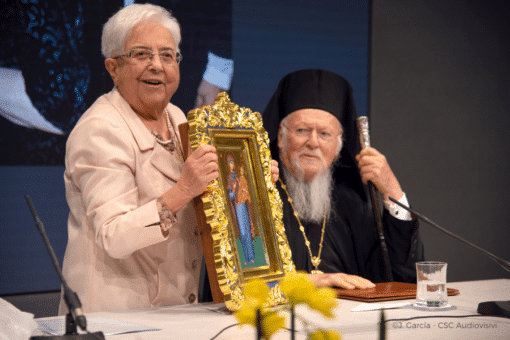
Oct 20, 2020 | Non categorizzato
This morning His Holiness Bartholomeo 1, Ecumenical Patriarch of Constantinople paid a visit to the international centre of the Focolare Movement in Rocca di Papa. He was welcomed by Focolare President Maria Voce, who escorted him to visit the house where founder Chiara Lubich lived. He then prayed at her tomb. Joined by Co-President Jesús Morán and a small Focolare delegation, there followed an exchange of greetings and gifts. The Patriarch was in Rome for the international Prayer for Peace meeting promoted by the Community of Sant’Egidio being held at the Campidoglio (Capitoline Hill) today. Tomorrow he will receive an Honorary Doctorate in Philosophy from the Antonianum University. The Patriarch will also be meeting with Pope Francis.
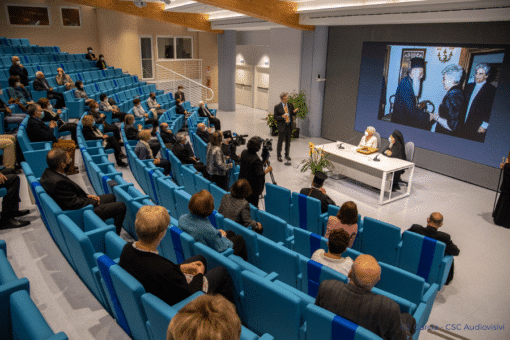
©J. García – CSC Audiovisivi
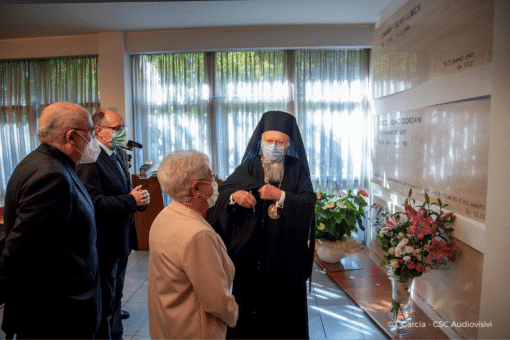
©J. García – CSC Audiovisivi

©J. García – CSC Audiovisivi
Stefania Tanesini
To read the homily of His Holiness Bartholomew, Archbishop of Constantinople, click here https://vimeo.com/470297305
Oct 20, 2020 | Non categorizzato
On Tuesday 20 October in Rome the International Prayer Meeting for Peace will take place: participants will include representatives of world religions. The initiative is being promoted by the Sant’Egidio Community. Maria Voce, president of the Focolare Movement will also be present. The event can be followed via streaming. “We are very happy that this meeting can take place because we need words of peace, words of hope, words that indicate a future for humanity that is overwhelmed by this pandemic.” This is how Marco Impagliazzo, president of the Sant’Egidio Community, presented the 2020 International Prayer Meeting for Peace. The event will be inspired by the spirit of Assisi and will be attended by representatives of the great world religions. It is entitled “Nobody is Saved Alone – Peace and Fraternity” and will take place today, 20 October, in Rome, Italy in Piazza del Campidoglio. It will gather together members of different faiths and representatives of many different institutions for a solemn moment of reflection that aims to offer a message of hope for the future. During this event there will be time for prayer, each according to his or her own tradition. A number of speakers will also offer interventions highlighting the contribution of religions in building a better future of peace and fraternity, especially now that the pandemic is causing widespread social and economic suffering. The president of the Focolare Movement, Maria Voce, will be among the participants. The event is scheduled to begin at 4.30 p.m. (utc+2) when the religious representatives will gather in different locations for prayer. Christians will meet for ecumenical prayer in the Basilica of St. Mary in Aracoeli (click here for the programme). At approximately 5.20 p.m. (utc+2) the meeting will take place in Piazza di Campidoglio. During the ceremony, keynote addresses will be given by Sergio Mattarella, the President of the Italian Republic, Andrea Riccardi, the founder of the Sant’Egidio Community and Ursula von der Leyen, the President of the European Commission who has recorded a video message. Interventions will also be made by the Patriarch of Constantinople, Bartholomew I, the Chief Rabbi of France, Rav Haim Korsia, the Secretary General of the Superior Committee of the Human Fraternity, Dr. Mohamed Abdelsalam Abdellatif, from the Ven. Shoten Minegishi (Soto Zen Buddhism), Dr. Karmaljit Singh Dillon (Sikh Gurdwara Parbandhak National Committee) and Mrs. Divya Punchayil Prashoban (Hinduist representative). Pope Francis will conclude this part of the meeting. The ceremony will then continue with a minute’s silence in memory of the victims of the pandemic and of all wars, the reading of the 2020 Appeal for Peace which will be delivered by a group of children to the ambassadors and representatives of national and international politics and the lighting of the peace candle by Pope Francis. The “Prayer Meeting for Peace” will be broadcast in full live streaming on the event website and on the social channels of the Sant’Egidio Community.
Lorenzo Russo
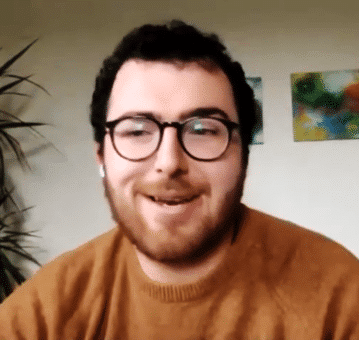
Oct 20, 2020 | Non categorizzato
A webinar to retrace the story of the Gen Movement, one of the most revolutionary youth movements founded in the last century that still continues its work in the 21st century.
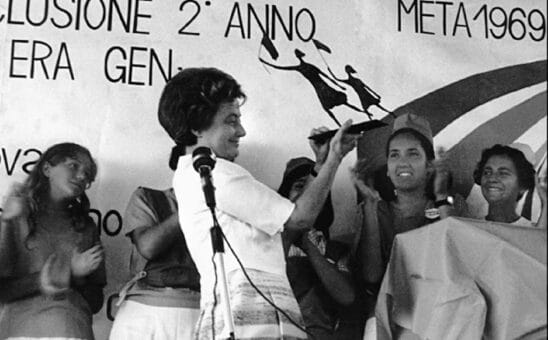
© CSC Audiovisivi – Archivio
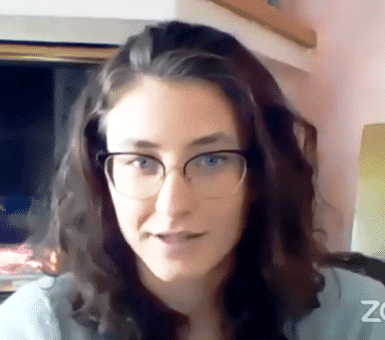
Laura Salerno

Conlet Burns
Michele Zanzucchi
Oct 19, 2020 | Non categorizzato
Christians know the exam they will face at the end of their lives. Jesus, in fact, revealed the questions he will ask us when we come before him. They are more relevant than ever – as Chiara Lubich explained. We urgently need to transform all our relationships into Christian relationships: with our siblings, parents, relatives, colleagues, acquaintances, and people all over the world. Encouraged and enlightened by love, we need to create both individual and social works. Let’s remember that if a glass of water will be rewarded, then a hospital, a school, an orphanage, a place to help young people in trouble, and much else, established as a way of expressing our charity, will prepare us for a brilliant final exam. Then God will say to us: “I was hungry in the members of your family just as I was hungry in the people of India. Seeing me in them, you gave me food. “I was thirsty. I needed clothing, in your little children and in your brothers and sisters in many nations where people live in inhuman conditions. And you, seeing me in all of them, clothed me with what you had. “I was orphaned, hungry and sick in your own neighbourhood just as I was in the people of Pakistan who are overwhelmed by disasters, and you made every effort to help me. “You put up with your father in law, or your highly strung wife, or your difficult employees, or an unfriendly manager, because you were convinced that perfect social justice will only flourish through social charity; and you did this because you saw me in everyone”. “You visited a relative in prison, you prayed and brought aid to those who live oppressed and abused in the depths of their spirit…”. We will be astonished and just one word will come to our lips: “thank you!” Thank you, my God, for having opened up a way for us here on earth, the shortest and quickest way to reach our heavenly destination.
Chiara Lubich
Oct 17, 2020 | Non categorizzato
We visit different parts of Nigeria, where some people from the Focolare Movement show us their initiatives and projects offering care, sustainability, education and entrepreneurship locally. Full length version in English will be available soon. https://vimeo.com/464140739
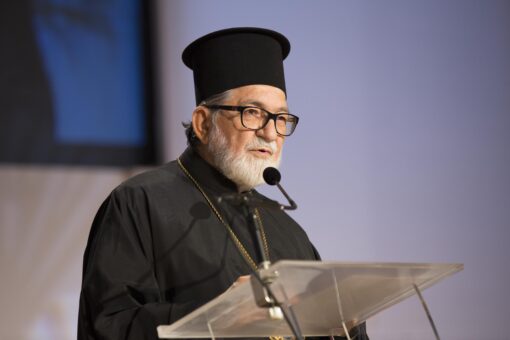
Oct 16, 2020 | Non categorizzato
A brief profile of the Metropolitan who was a great friend of the Focolare; it is also an expression of Maria Voce’s prayers and closeness to him, on behalf of the whole Movement.  Today 16th October, the Orthodox Archdiocese of Italy and Malta (Patriarchate of Constantinople) announced that Metropolitan Gennadios has “passed into heaven” [1]. He lived in Italy for 57 years, first as a parish priest in Naples, in 1970 as Bishop of Kratea and then from 1996 as archbishop of the diocese of Italy and Malta and exarch of Southern Europe, the seat of which is in Venice. Metropolitan Gennadios had a great love for the faithful of his Archdiocese that emerges from a recent letter (dated 3rd October), in which he wrote: “You are in my heart. You are my life!”[2]. In 2007 Patriarch Bartholomew said of him: “with immense love […] you have worked for many years in a missionary way for your flock, distinguishing yourself as having many and various charisms, which express the personality of your Eminence. The following can be singled out from your character as being the greatest: humility, gentleness, tranquility and wisdom. But the greatest of all is your love and faith towards the Mother Church”[3]. He was a man of dialogue who actively participated in ecumenical activity in Italy and beyond, as can be seen in this interview with Vatican Radio in 2015: “Praying means walking together and, as Pope Francis once told me, ‘walking it means union. When we walk together, unity is closer to us ‘” [4]. Speaking of the division of Christians, he said “We must now be crucified, we must climb onto the cross, to make our passions, our defects and our errors all disappear. Jesus Christ no longer comes to be crucified but we must be on the cross to erase fanaticism, hatred, selfishness”[5]. A great friend of the Focolare Movement, the Metropolitan often recalled an interview with Patriarch Athenagoras in 1970. “He received me for 48 minutes! Numerous bishops, priests, theologians and others were in the corridor waiting for the blessing of the Patriarch. Everyone was amazed that I had been in audience for so long […] What had happened? The Patriarch had talked about me for 2 minutes, about Pope Paul VI for 5 minutes and about Chiara for 40 minutes! “[6] He took part in many events of the Focolare: from the meetings of the bishops who are friends of the Movement, to the schools of ecumenism and the ecumenical weeks organized by the Centro “Uno” [7]. During the last edition, in 2017, he gave Maria Voce a medal in recognition and gratitude for the ecumenical work of the Focolare. It was his idea to found the “Patriarch Athenagoras – Chiara Lubich International Ecumenical Chair”, of which he was joint holder, at the Sophia University (Loppiano, Italy) and in 2017 he held the inaugural lecture entitled “Patriarch Athenagoras and Chiara Lubich, protagonists of unity”[8]. Metropolitan Gennadios was able to meet Chiara a few days before her death when he visited her, together with Patriarch Bartholomew, at the “Gemelli” Polyclinic hospital in Rome. Of that last meeting he remembered: “She was full of joy, smiling as always, gentile, serene and her “Charism” was very much alive. In fact, her last words before leaving us were “Always united!” [9] Metropolitan Gennadios seems to have fulfilled what Patriarch Athenagoras prophetically told him in 1960: “You will go to Italy, we need new priests for the times to come, times of reconciliation and dialogue with the Catholic Church” [10].
Today 16th October, the Orthodox Archdiocese of Italy and Malta (Patriarchate of Constantinople) announced that Metropolitan Gennadios has “passed into heaven” [1]. He lived in Italy for 57 years, first as a parish priest in Naples, in 1970 as Bishop of Kratea and then from 1996 as archbishop of the diocese of Italy and Malta and exarch of Southern Europe, the seat of which is in Venice. Metropolitan Gennadios had a great love for the faithful of his Archdiocese that emerges from a recent letter (dated 3rd October), in which he wrote: “You are in my heart. You are my life!”[2]. In 2007 Patriarch Bartholomew said of him: “with immense love […] you have worked for many years in a missionary way for your flock, distinguishing yourself as having many and various charisms, which express the personality of your Eminence. The following can be singled out from your character as being the greatest: humility, gentleness, tranquility and wisdom. But the greatest of all is your love and faith towards the Mother Church”[3]. He was a man of dialogue who actively participated in ecumenical activity in Italy and beyond, as can be seen in this interview with Vatican Radio in 2015: “Praying means walking together and, as Pope Francis once told me, ‘walking it means union. When we walk together, unity is closer to us ‘” [4]. Speaking of the division of Christians, he said “We must now be crucified, we must climb onto the cross, to make our passions, our defects and our errors all disappear. Jesus Christ no longer comes to be crucified but we must be on the cross to erase fanaticism, hatred, selfishness”[5]. A great friend of the Focolare Movement, the Metropolitan often recalled an interview with Patriarch Athenagoras in 1970. “He received me for 48 minutes! Numerous bishops, priests, theologians and others were in the corridor waiting for the blessing of the Patriarch. Everyone was amazed that I had been in audience for so long […] What had happened? The Patriarch had talked about me for 2 minutes, about Pope Paul VI for 5 minutes and about Chiara for 40 minutes! “[6] He took part in many events of the Focolare: from the meetings of the bishops who are friends of the Movement, to the schools of ecumenism and the ecumenical weeks organized by the Centro “Uno” [7]. During the last edition, in 2017, he gave Maria Voce a medal in recognition and gratitude for the ecumenical work of the Focolare. It was his idea to found the “Patriarch Athenagoras – Chiara Lubich International Ecumenical Chair”, of which he was joint holder, at the Sophia University (Loppiano, Italy) and in 2017 he held the inaugural lecture entitled “Patriarch Athenagoras and Chiara Lubich, protagonists of unity”[8]. Metropolitan Gennadios was able to meet Chiara a few days before her death when he visited her, together with Patriarch Bartholomew, at the “Gemelli” Polyclinic hospital in Rome. Of that last meeting he remembered: “She was full of joy, smiling as always, gentile, serene and her “Charism” was very much alive. In fact, her last words before leaving us were “Always united!” [9] Metropolitan Gennadios seems to have fulfilled what Patriarch Athenagoras prophetically told him in 1960: “You will go to Italy, we need new priests for the times to come, times of reconciliation and dialogue with the Catholic Church” [10].
Joan Patricia Back
[1] website ortodossia.it [2] website ortodossia.it [3] website ortodossia.it [4] Interview with Vatican Radio 23rd January 2015 on website ortodossia.it [5] Interview with Vatican Radio 23rd January 2015 on website ortodossia.it [6] Talk at the 50th anniversary of Centro “Uno”, Trent (Northern Italy) 12th March 2011 [7] Centro “Uno” for the unity of Christians promotes and follows the Focolare Movement’s ecumenical commitment. [8] www.sophiauniversity.org/it [9] Talk at the 50th anniversary of Centro “Uno”, Trent (Northern Italy) 12th March 2011 [10] website ortodossia.it








